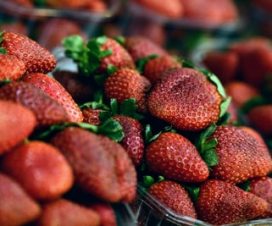
I was recently at a function giving my expertise on how to get fit in any busy schedule when I overheard a conversation that troubled me. It was between two women. They were discussing the idea of organic foods.
One of them commented on how they don’t like the idea of so many different chemicals and hormones used and the other said in a nut shell that it was more hype than anything and that Canada did not allow hormones to be used in our food.
I was shocked. I wanted to go over and shake her and ask her if she was serious, but I also wanted to be sure to have my facts very clear.
The Search Begins…
I hit the internet to try and confirm what I knew already. I looked up in all my resource books about organic vs. Non organic foods, and I even went right to the meat department of a major supermarket to ask how their meat is grown. What I found was comforting to me. It was everything that I already knew and believed, but what was shocking was the direct “say it as it is” response that I got from the meat manager from the supermarket.
My question to him was simple….does Canada use hormones in their meats when raising chicken, cattle and pigs. He didn’t even hesitate. It was a resounding “yes”. He went on to say that in the example of a chicken, that it takes 6 weeks for a chicken to fully mature.
There is no way a chicken is fully mature without the use of hormones. He then continued explaining to me that is why organic chickens cost more….the chickens are “full grown”. That means they are producing every hormone that the body requires in that amount of time.
By the way, I appreciated the fast and efficient way that he gave me that information. Like any good educated, professional, life long researcher and somebody who has been there and understands the issues that are pertinent to us, I appreciated his quick and response to my question.
But if I asked him….Does Canada use hormones in their meats when raising chickens, cattle and pigs? He didn’t even hesitate. It was a resounding “yes”.
So when you take into consideration where I was coming from, your probably wondering now….why did I get so stupid? Well, let me explain. I grew up on a farm and my dad was a farmer. He taught us that we could do anything we wanted to if we worked for it. But, that also included the ability to choose between different choices and make the proper choices. But, in terms of choices we had little selection, which is why we did what we did. We did what everybody did….we ate what was fast, cheap, and easy. Unless we were getting some organic food, that was it….no thought, no planning, no personally investing in what we were eating….just eat, eat, eat. Naturally, our eating style quickly heading into obesity with health problems that will take many years to correct.
But, throughout my young adulthood and thirties, I loved being active, playing sports, and I lifted weights; thinking that was the only way to be “healthy”. As I got older, I started to realize that everything I did was not just going to help me lose weight, but was actually going to make me feel better, have more energy, and help me live a longer healthier life. And what I learned, by experimenting with my diet, was that I wasn’t eating enough healthy food to feel the best I could. I was eating way too much of the wrong things, andLittleby LittleI learnedWhat I learnedis simply that healthy food, real food, is not expensive, it’s not fast, it’s not convenience, it takes more time to prepare, and ultimately it gave me more energy and provided me a better quality of life.
These days, with my responsibilities as a mother and engineer, I’m always researching and reading about how to best prepare and preserve foods so that I can maximize their nutritional value. In this quest, I run across too many extravagant claims of the super foods that are supposed to make you healthy. The thing is, many of these claims are flat out lies, and others, are probably right but not recorded properly.
A good example of the discrepancies and propaganda that is put forth is the popular organic food scare. It is said that foods that are certified organic, have been grown with soils proven to be organic, etc. But here’s the problem, certified organic foods are typically grown by large corporations, for large corporations, at enormousexpense. Organic foods are thereforeat least somewhat sellsaded, and definitely more expensive than typical mass produced foods. But here’s the thing, if you could find a product that was truly 100 percent organic that actually tasted good, would you buy it? You would!




